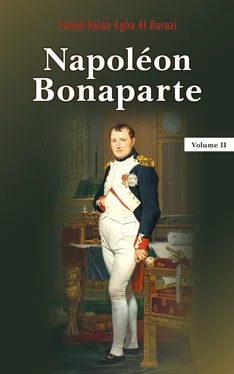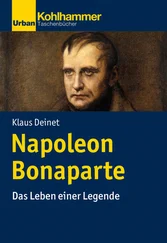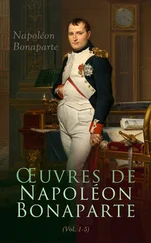Fahed Aslan Agha Al Barazi - Napoléon Bonaparte
Здесь есть возможность читать онлайн «Fahed Aslan Agha Al Barazi - Napoléon Bonaparte» — ознакомительный отрывок электронной книги совершенно бесплатно, а после прочтения отрывка купить полную версию. В некоторых случаях можно слушать аудио, скачать через торрент в формате fb2 и присутствует краткое содержание. Жанр: unrecognised, на английском языке. Описание произведения, (предисловие) а так же отзывы посетителей доступны на портале библиотеки ЛибКат.
- Название:Napoléon Bonaparte
- Автор:
- Жанр:
- Год:неизвестен
- ISBN:нет данных
- Рейтинг книги:4 / 5. Голосов: 1
-
Избранное:Добавить в избранное
- Отзывы:
-
Ваша оценка:
- 80
- 1
- 2
- 3
- 4
- 5
Napoléon Bonaparte: краткое содержание, описание и аннотация
Предлагаем к чтению аннотацию, описание, краткое содержание или предисловие (зависит от того, что написал сам автор книги «Napoléon Bonaparte»). Если вы не нашли необходимую информацию о книге — напишите в комментариях, мы постараемся отыскать её.
Napoléon Bonaparte — читать онлайн ознакомительный отрывок
Ниже представлен текст книги, разбитый по страницам. Система сохранения места последней прочитанной страницы, позволяет с удобством читать онлайн бесплатно книгу «Napoléon Bonaparte», без необходимости каждый раз заново искать на чём Вы остановились. Поставьте закладку, и сможете в любой момент перейти на страницу, на которой закончили чтение.
Интервал:
Закладка:
Is this Napoléon that we know? He now forty years old, yet he writes a puerile letter out of context with his character. But Napoléon needs an heir. He already has two illegitimate sons by Duchess Walewska and Eleonore Danuelle, a lady-in-waiting to Caroline Murat. But above all he decides that his marriage must consolidate his regime and rise to the standard of the oldest European Royalty. He is not only the emperor of the French; like Charlemagne, he is the Emperor of Western Europe, and who better than the Hapsburgs, whose dynasty has ruled an empire for over eight hundred years, to provide him with both an heir of a Royal blood and a Royal noble lineage. Yes, he loves Walewska and she whole heartedly requites his love, but his marriage goes beyond personal feelings. “It is affair of state, and for France I must sacrifice my personal feelings.”
Marshal Berthier, his chief of staff and trusted friend, is dispatched to Vienna to finalise the wedding by proxy. With him he carries a miniature of Napoléon, set in diamonds, and jewellery worth millions as a token of affection for his bride to be. Napoléon had already learned from Countess Metternich, during a masked ball given by the Arch-Chancellor, that although she did not know whether the Archduchess would accept the offer, it would be Prince Schwarzenberg, the new Austrian Envoy to Paris, who could communicate the Emperor’s wishes.
In February 1810, having given up hope for a marriage with the Tzar’s 15-year-old sister Anna, he turns to the Austrians and formally ask their Ambassador Schwarzenberg to convey the Emperor’s wishes for an offer of marriage with the eighteen-year-old Archduchess Marie-Louise. The Austrians promptly accepted the offer and preparations were made to finalise the formalities.
At the proxy weeding in Vienna at the Hofburg, the Emperor was represented by Marshal Berthier, and the bride’s uncle Archduke Karl, who had defeated Napoléon at Aspern-Essling and was himself defeated later at Wagram by Napoléon.
As he waits the arrival of his bride, Napoléon is occupied not by the affairs of State, but meticulous preparations of furniture, wardrobes and Marie-Louise’s boudoir. He is in an ecstatic mood, and his eagerness to consummate the marriage reaches its crescendo. Arrangements have been made to greet his bride with flowers on every stop on her way to Compeign.
On a spring day of March 1810, ignoring the heavy downpour, Napoléon steps into his coach, accompanied by his sister Caroline and her husband Marshal Murat, bedecked in his flamboyant uniform, and orders the coachman to whip the horses and speed to Campiegne. He wanted to take his bride by surprise, so instead of the decorated armorial bearings, he laid aside his heavily embroidered coat and donned his old uniform. Elaborate preparation had been made for this milestone event, but on reaching Soissons, where the two parties were to meet, the over-eager Napoléon ordered the coachman to stop, and then he and Murat alighted at the doorway of the medieval church to take shelter from the rain. While the horses of the bridal procession were being changed in a downpour, the emperor approaches, hoping to take Marie-Louise by surprise, but her master-of-the-horse, recognising him, exclaims “His Majesty the Emperor!”. Drenched with rain, he flung the carriage door open and threw his arms around the bewildered young Archduchess, showering her with kisses. One can imagine the embarrassed young princess, although at a loss for words, still manages to utter a few compliments to the emperor; smiling, he ordered the coachman to proceed to Compiegne.
At Compiegne, dignitaries drenched with rain await the emperor and his bride, amongst them members of the imperial family. At one in the morning, after dinner, Napoléon hastily bade his courtiers and family members goodnight, and whisked the empress to his chamber, breaching all forms of etiquette and the weeks of elaborate preparations that were made for this occasion. Protesting this abrupt move, Marie-Louise told Napoléon that the marriage could only be consummated by the blessing of the church.
“And so it will be,” said Napoléon. At hand amongst the dignitaries was Cardinal-Uncle Fesch, who was promptly summoned. As clerical authority he assured the young empress that the proxy marriage in Vienna was valid and that she is already the emperor’s wife. Assuaged with these words, the couple retired to their chamber.
Next morning, an ecstatic Napoléon orders breakfast to be brought to the empress’ bedside. Compiegne’s inhabitants are buzzing with last night events and all eager to take a glimpse at the newly wed imperial couple.
Meneval, Napoléon’s secretary, after having seen the empress for the first time, wrote in his memoirs: “She is in the flower of youth; her figure is angular and graceful. Her rosey complexions intensified by the course of the journey and her dignified shyness. Her dress, longer that that worn in Paris, contrasting subtly with the disgraceful revealing one worn by French ladies; her fine light chestnut-colored hair adorned her lovely invigorated young face. Her moist blue eyes radiate sweetness and give a charming expression; her lips full and her chin slightly jutted a distinguished mark among the Hapsburg imperial family.”
Napoléon’s uxorious feeling for his wife Marie-Louise is unreservedly expressed; “she is charming and warm hearted,” he tells Meneval, who in this period becomes practically inseparable from the emperor. By contrast to Josephine, the emperor’s family get on very well with the empress, and this delights him. Napoléon displays affectionate feelings towards his young wife; he gently caresses her and call her “Petit bonne animale”; she requites his feelings, and although shy and embarrassed by his appearance during her intimate moments in her boudoir, she affectionately receives him.
After his victory at Wagram, Napoléon ordered Massena at the head of three French corps d’arme to land in Spain and deal with the British menace once and for all. His objective was to recapture Portugal, while Marshal Soult’s army of the south embarked on the re-conquest of Andalusia. As Soult advanced towards Badajoz, the Junta, unable to oppose him in open battle, fled with the city’s garrison and joined their brethren at Cadiz, where they put themselves under the command of the Regency on behalf of the infant Ferdinand. When Marshal Victor arrived on February 5th, 1810 it was too late; for by then General Albuquerque had been able to enter Cadiz with his 10,000 men, arriving from Merida just in time (3 February) to re-enforce the 2400 men garrison and an additional 3000 volunteers arriving by sea. The siege of the great naval port became hopeless when Wellington arrived by sea with 5 battalions, two of them Portuguese. Despite several attempts by the French to storm the port, their efforts were futile, and the city proved impregnable. 60,000 French troops were tied down, but Marshal Soult would not lift the siege, which lasted till 1812.
As for Marshal Massena, his campaign in Portugal started on May 28, 1810, when he took over the command at Salamanca. He next besieged and captured Ciudad Rodrigo and Almeida, securing the northern corridor linking Spain and Portugal. Intent on delivering a shattering blow to Wellington forces, he advanced over the river Côa, but his attempt to drive Wellington out of his fortifications proved in vain.
Napoléon, when receiving the news from the Iberian Peninsula as they unfolded, clung to the belief that his Marshals would still deliver the final blow to the British. So far, during the month of May and the ones that followed, things still looked promising; Cadiz was besieged and over 20,000 British, Spaniards and Portuguese were trapped, and Massena had successfully thrown Wellington back to the lines of Torres-Vedras. This is how the situation looked on October 11, 1810 in the Iberian Peninsula. But unknown to Napoléon, the French would soon encounter reverses. Wellington’s dogged refusal to be lured into open battle with Massena’s army, remaining in his dug in well-fortified positions behind the Torres-Vedras lines, had finally forced Massena to retreat on March 3rd, 1811 due to the lack of provisions; while the siege of Cadiz would continue in vain till August 1812, tying up some 60,000 badly needed French troops in other theatres of war.
Читать дальшеИнтервал:
Закладка:
Похожие книги на «Napoléon Bonaparte»
Представляем Вашему вниманию похожие книги на «Napoléon Bonaparte» списком для выбора. Мы отобрали схожую по названию и смыслу литературу в надежде предоставить читателям больше вариантов отыскать новые, интересные, ещё непрочитанные произведения.
Обсуждение, отзывы о книге «Napoléon Bonaparte» и просто собственные мнения читателей. Оставьте ваши комментарии, напишите, что Вы думаете о произведении, его смысле или главных героях. Укажите что конкретно понравилось, а что нет, и почему Вы так считаете.












